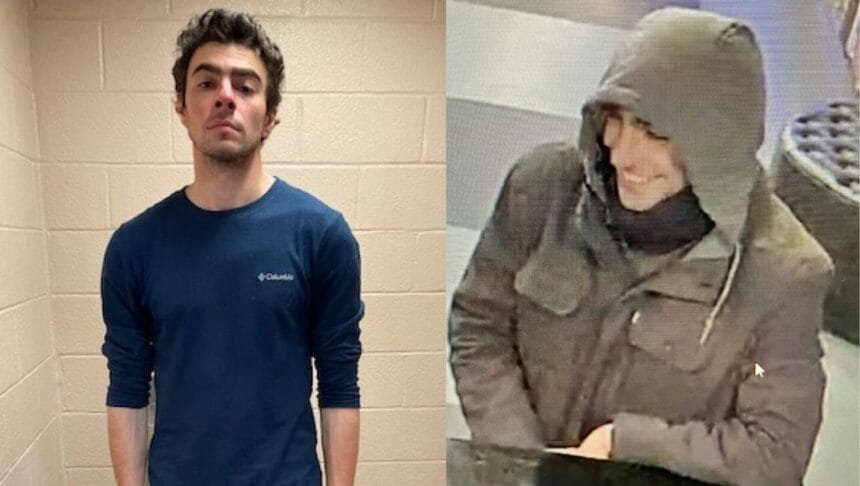Police and the public were shocked when Luigi Mangione was arrested in connection with the shooting death of UnitedHealthcare CEO Brian Thompson.
After a long search, Mangione, a 26-year-old Ivy League graduate, was caught in Pennsylvania.
The case, which has complicated motives, a long digital trail, and a lot of public opinion, has the whole country talking.
The Arrest and Initial Findings
Luigi Mangione was arrested at a McDonald’s in Altoona, Pennsylvania, after an employee recognized him from widely circulated photos.
Police found a ghost gun they think was the murder weapon, several fake IDs and a handwritten manifesto complaining about corporate America.
Deputy Chief Derek Swope of Altoona Police said Mangione was very nervous during his arrest, and when asked about his recent trips to New York, he showed clear signs of anxiety, which added to their suspicions.
A Privileged Background
Mangione’s background is very different from the populist anger that is often linked to critics of corporate America.
His family owns two country clubs and is very rich. He was the top student at the very good Gilman School.
He then got his bachelor’s and master’s degrees in computer science from the University of Pennsylvania. While there, he started a club for making games that has since grown to have over 50 members.
Even though Mangione grew up in wealth, his recorded anger toward corporate America points to deeper, more personal problems.
His posts on social media show that he is interested in philosophy, health, and controversial self-help authors. These posts paint a complicated picture of a man who is struggling with spiritual issues.
A Troubling Digital Footprint
Mangione’s online presence has become a focal point in the investigation. On his Goodreads page, he wrote nice things about the notorious Unabomber, Theodore Kaczynski.
Kaczynski’s statement also went after business leaders, which is a scary similarity to what Mangione is said to have done.
YouTube also stated that three of Mangione’s channels had been taken down.
Even though they hadn’t been used in months, these channels and a fourth fake account were included in the digital proof that was being looked at. Investigators are looking at Mangione’s online activities to find possible reasons or helpers.
Conflicting Perspectives on Personality
People who knew Mangione are shocked by what has been said about what he is said to have done. R.J. Martin, who used to live with Mangione in Hawaii, said that she was kind, friendly, and even a leader in the group of people who lived together.
Martin talked about Mangione’s problems with a back injury and surgery that followed, showing that he was more concerned with his own health and healing than with violence.
“As far as I could tell, he was not a violent person at all,” Martin said, adding that Mangione never brought up guns or any other form of violence while they were together.
The big difference between how he is seen by most people and the crimes he is accused of has made it even harder to figure out what he wants.
Evidence and Investigative Progress
While Mangione waits to be extradited, police are carefully putting together a timeline of his whereabouts and activities.
Investigators have executed search warrants at his known residences, collecting electronic devices and other things that may provide crucial insights.
Early evidence suggests that he went between Philadelphia and Pittsburgh before stopping for a while in Altoona.
Governor Josh Shapiro of Pennsylvania praised the McDonald’s worker whose alertness led to Mangione’s arrest and urged everyone to be just as alert.
During a news conference, Shapiro said, “This person acted like a hero.” He was talking about how important it is for the community to work together with ongoing investigations.
Corporate America and Public Outrage
The killing of Brian Thompson, a prominent figure in the U.S. healthcare industry, has ignited widespread debates about the role of for-profit companies in the nation’s healthcare system.
Thompson’s position as CEO of UnitedHealthcare placed him at the center of criticisms over healthcare accessibility and affordability.
However, Mangione’s privileged background complicates the narrative. Unlike many Americans burdened by healthcare costs, Mangione likely had access to extensive resources, raising questions about the true impetus behind his alleged actions.
Unanswered Questions
Despite the wealth of evidence, critical questions remain unanswered. Mangione’s handwritten manifesto reportedly makes no direct mention of Thompson, instead targeting corporate America as a whole.
This omission leaves investigators grappling with whether Thompson was a symbolic target or if other motivations were at play.
The lack of a plea at his initial court appearance and his apparent nervousness during questioning only add to the ambiguity.
Investigators are expected to release more details as they analyze the mounting evidence, including Mangione’s electronic communications and social media activity.
A Community Shaken
The repercussions of this high-profile case extend beyond law enforcement. Mangione’s arrest and the circumstances surrounding Thompson’s death have sparked widespread introspection about corporate influence and societal discontent.
Many are questioning the extent to which individuals, even those from privileged backgrounds, feel disillusioned with existing systems.
As the public awaits further updates, the case serves as a sobering reminder of the complexities of human behavior and the challenges of addressing systemic grievances without resorting to violence.
What Lies Ahead
Mangione’s next court appearance and potential extradition to New York will likely bring additional charges and further revelations.
As law enforcement continues to sift through evidence, the case is poised to remain a significant topic of discussion.
The story of Luigi Mangione is one of contrasts—between privilege and disenchantment, ambition and alleged criminality.
It is a narrative that raises pressing questions about societal pressures, personal struggles, and the lengths to which individuals may go to express their discontent.
Only time will tell how these threads weave into the broader tapestry of justice and understanding.



